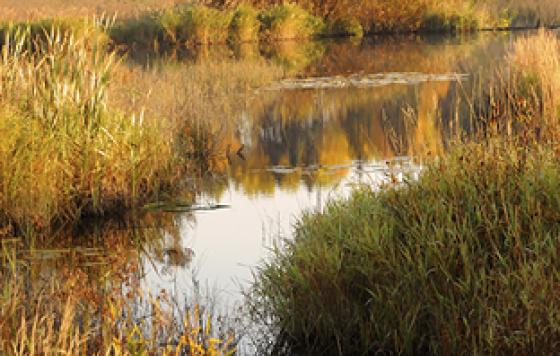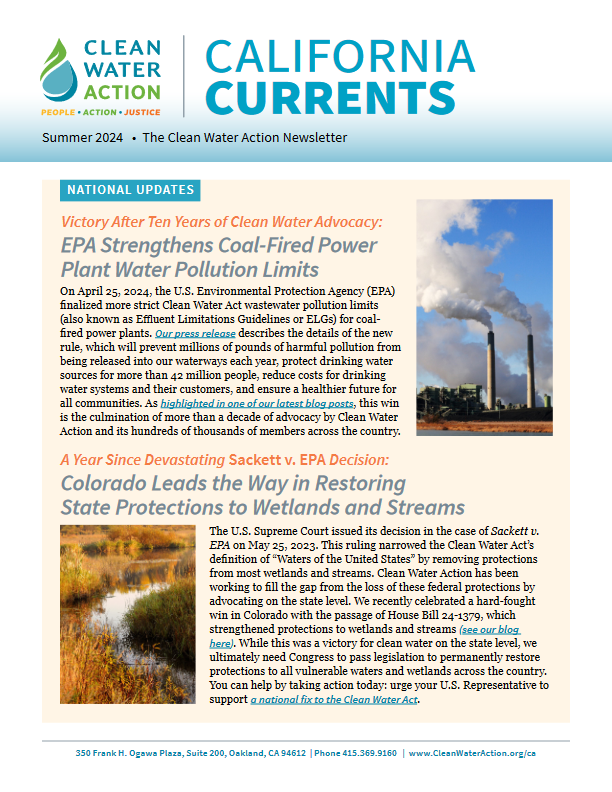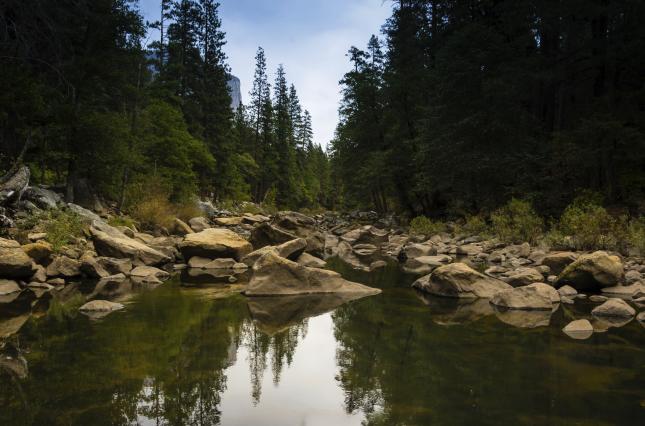In This Issue:
- National Updates
- Climate Bond is a Go for November!
- Water Affordability in California
- California Misses Opportunity to Make Real Change on PFAS
- Bringing Back California’s Beavers!
- Bay Lights Charters Case Study Shows the Impact of Reuse on the Bay
- Fenceline Communities Take a Win | Legislative Update
National Updates
Victory After Ten Years of Clean Water Advocacy: EPA Strengthens Coal-Fired Power Plant Water Pollution Limits
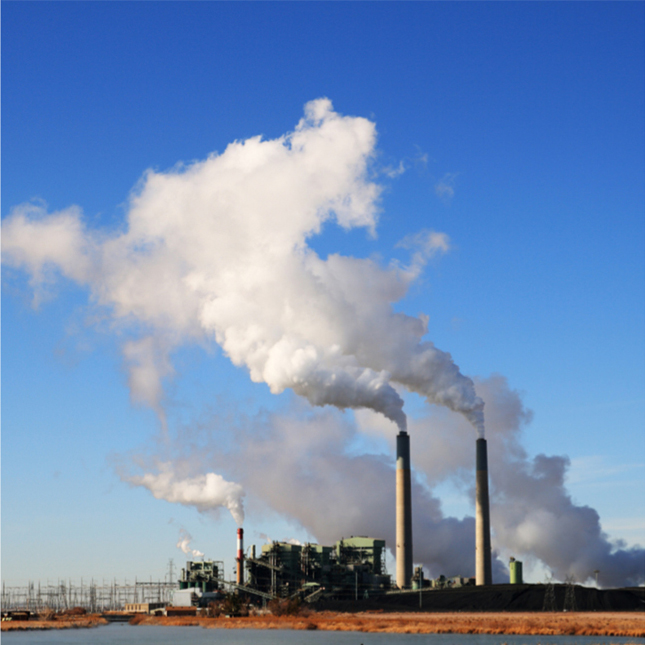
On April 25, 2024, the U.S. Environmental Protection Agency (EPA) finalized more strict Clean Water Act wastewater pollution limits (also known as Effluent Limitations Guidelines or ELGs) for coal-fired power plants.
Our press release describes the details of the new rule, which will prevent millions of pounds of harmful pollution from being released into our waterways each year, protect drinking water sources for more than 42 million people, reduce costs for drinking water systems and their customers, and ensure a healthier future for all communities. As highlighted in one of our latest blog posts, this win is the culmination of more than a decade of advocacy by Clean Water Action and its hundreds of thousands of members across the country.
A Year Since Devastating Sackett v. EPA Decision: Colorado Leads the Way in Restoring State Protections to Wetlands and Streams
The U.S. Supreme Court issued its decision in the case of Sackett v. EPA on May 25, 2023. This ruling narrowed the Clean Water Act’s definition of “Waters of the United States” by removing protections from most wetlands and streams. Clean Water Action has been working to fill the gap from the loss of these federal protections by advocating on the state level. We recently celebrated a hard-fought win in Colorado with the passage of House Bill 24-1379, which strengthened protections to wetlands and streams (see our blog here). While this was a victory for clean water on the state level, we ultimately need Congress to pass legislation to permanently restore protections to all vulnerable waters and wetlands across the country. You can help by taking action today: urge your U.S. Representative to support a national fix to the Clean Water Act.
Climate Bond is a Go for November!
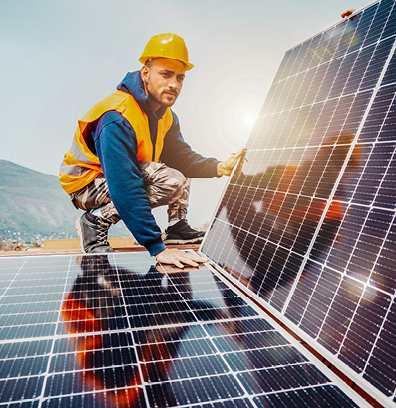
State legislators have overwhelmingly voted to include a $10b climate bond on the November ballot. This bond will allow the state to continue to meet its climate resilience goals for both reducing greenhouse gas emissions and addressing the impacts of climate change.
We’re thrilled that the bond allocates $610 million for safe drinking water. The State’s drinking water program just last month released a report showing an unmet need of $5.4 billion to address failing and at-risk water systems, so every little bit helps! These systems already had problems, but climate change has thrown extreme drought, floods, and wildfires their way, making their already tough issues even worse.
Water Affordability in California
Water bills continue to rise in California, faster than inflation. That’s a big reason why nearly 1.6 million households fell behind in paying their water bills during the pandemic. While Clean Water Action, working with state agencies, water systems, and other advocates, was able to obtain nearly $900 million in funding in 2022 to pay some of this water debt, delinquencies are on the rise again.

That’s why we’re sponsoring SB 1255 (Durazo-Los Angeles), a bill which would require the state’s largest water utilities to provide a minimum level of low-income rate assistance to their most vulnerable households. The program would rely on small voluntary contributions from current ratepayers to fund bill assistance for those households.
SB 1255 is a small step towards realizing the human right to water. Please join us in supporting the bill.
California Misses Opportunity to Make Real Change on PFAS
Politics and money got in the way of progress this year as two Clean Water Action sponsored bills to address toxic PFAS chemical pollution stalled in the Legislature.
SB 903 (Skinner-Berkeley) would have banned PFAS chemicals except for essential uses for which there are currently no alternatives and the product is a benefit to society (think medical devices or semiconductors). Introducing this bill was part of Clean Water Action’s strategy to protect our health and water quality by stopping PFAS contamination at the source. In a “penny wise, but dollar foolish” decision, the Senate Appropriations committee stalled the bill, despite the future costs of remediating PFAS in the water systems of over 20 million Californians. The bill did, however, get a favorable response in its first policy committee and we’ve built a diverse and powerful coalition of environmental and health groups, as well as wastewater agencies ready to work with the Legislature and reintroduce the bill in 2025.
The future is less promising for AB 2761 (Hart-Santa Barbara), which would have banned PFAS and polyvinyl chloride (PVC or #3 plastic) in plastic packaging. Both are highly toxic, remain in the environment, and are virtually non-recyclable. These chemicals are also associated with cancers, reproductive harm, and other serious health problems. Because of these issues, the bill passed through its first house but stopped in the Senate because of an agreement made with industry to stall further progress until a 2022 plastic reduction bill (SB 54) goes into effect. In other words the bill got caught up in a political game, which means that Californians will continue to be exposed to dangerous chemicals in plastic packaging that industry leaders like Coke or Target are saying are unnecessary.
Not all of the news is negative, however. We are working with the State Water Board on a program to do more comprehensive testing of small water systems that have, to date, been left out of PFAS testing requirements. Finally, the federal EPA finalized a National Primary Drinking Water Regulation (NPDWR) establishing legally enforceable levels for six PFAS in drinking water that, once in effect, will drive more water treatment and protect public health.
Bringing Back California’s Beavers!
What improves water quality, builds healthy ecosystems, fights climate change, and builds wetlands that store water, prevent drought, and fight wildfires? It’s none other than the North American Beaver! That’s why Clean Water Action supports AB 2196 (Connolly-Marin), which will establish a state program to promote beaver restoration across California.
Beavers are more than just cute. They’re one of the most cost-efficient, sustainable solutions for ecological restoration and climate change resilience. Help us return these furry engineers to the California landscape by calling your state senator and asking them to vote “aye” on AB 2196.
Bay Lights Charters Case Study Shows the Impact of Reuse on the Bay
ReThink Disposable is always excited to share our current case studies, and Bay Lights Charters is no exception. Bay Lights Charters is an on the Bay event and dining experience, launching from San Francisco and docking at home in the island city of Alameda. As a member of the Alameda Chamber of Commerce, co-owner Allie Hawkins worked with the sustainability committee and reached out to ReThink Disposable to discuss our collaboration with the City of Alameda and Alameda County StopWaste to provide incentive funding to switch from single-use disposables to sustainable reusables for her charter events on the Bay.
According to Hawkins, “this was a huge priority to us not only because we are on the Bay every day and can see the animals, but because we want to maintain its beauty for all our guests.”
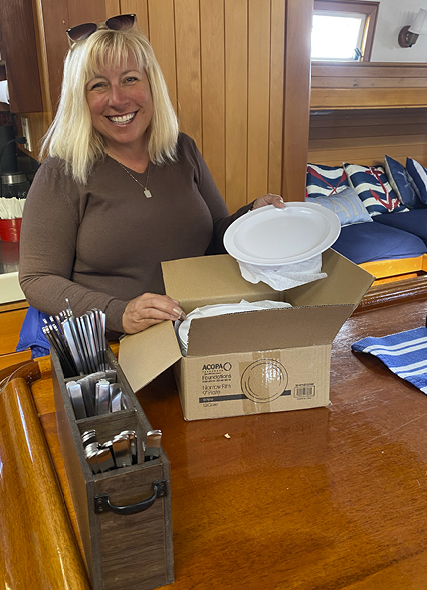
Prior to the switch, Allie was reliant on purchasing plastic silverware and cups with plastic lids and on catering companies providing single-use plastics for her clients’ events. After her 100% conversion to reusable foodware, she is not only seeing major cost savings but significant annual single-use plastics reduction and her clients are enjoying the elevated dining experience. It took Bay Lights Charters an average of 3.8 months to begin seeing cost savings and they now are on track to save $1,546 annually on single use disposables. Allie is also keeping 18,163 pieces of plastic out of the waste stream annually for a whopping total of 172 pounds a year!
Although the boat has a 49 person maximum, Bay Lights Charters has made a huge impact. Working in collaboration with the City of Alameda and Alameda County StopWaste, we were able to convert 100% of Allie’s plastic purchases as well as her serving trays and bowls. The items and pounds per year savings on the serveware are not included in the impact numbers as they were provided by the catering companies, not purchased by Bay Lights Charters. But as we can see, even a little can go a long way!
This Plastic Free July, ReThink Disposable encourages everyone to talk to their favorite restaurants and ask them to make the switch. Not only can the business do better for our environment and reduce single-use plastics, they can also save money! We also encourage you to reach out to your local Chambers of Commerce and Merchants Associations to discuss how they are helping their food service members comply with local and state reuse ordinances and to get involved with the sustainability teams in your own community.
Fenceline Communities Take a Win
Communities situated less than a mile from oil and gas production celebrate a huge victory as Big Oil rescinded their referendum against the 3200 ft Health and Safety bufferzone. Effective immediately, no new permits are allowed within 3200 ft of any California school, clinic, hospital, or neighborhood. Any pumpjack already within the area will not receive a renewed permit once their current permit expires.
For almost a decade families have been fighting to protect their children from the harmful effects of nearby oil and gas production. Several years of effort for even a 2500 ft bufferzone were heavily opposed by Big Oil, who stated that they would lose money and jobs, while not taking into account the health and financial cost to surrounding families.
The buffer was recommended by a panel of health experts convened by the state’s oil regulator, CalGEM. That recommendation allowed the legislation to succeed on the third attempt, with the passage of SB 1137 (Gonzalez-Long Beach) in 2022. The governor signed the bill into law on a Friday afternoon; on the following Monday, Big Oil submitted their referendum. They spent millions to place this measure on the November 2024 ballot, but gave up as they saw support for the measure growing.
Legislative Update
We’re working hard to get key bills to the Governor’s desk by the end of California’s legislative session in August. In addition to SB 1255 (see page 3), we’re also sponsoring AB 828 (Connolly-Marin). This bill ensures small farmworker communities have access to drinking water by exempting them from groundwater pumping restrictions, while still protecting our diminishing wetlands. We’re also helping to lead a coalition of over 180 organizations to put a water and climate bond on the November ballot that ensures all Californians, especially those in often neglected communities, are benefited equitably. For more on our priorities, click here.
This victory is evidence that when people come together, no obstacle or opposition is too big to be toppled.
Thank you for supporting our year-end campaigns, and our ongoing work to restore and protect our communities.
CURRENTS is published by Clean Water Action and Clean Water Fund.
Reproduction in whole or part is permitted with proper credit. © 2023 All rights reserved.
